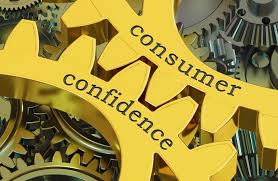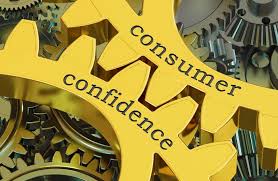
The coronavirus pandemic that has upended the life of citizens of the United States and has discouraged them from spending has resulted in the US consumer sentiment for the month of March touching a 3-1/2-year low. Consumer spending was also slow in February. These figures have further hinted at a recession in the economy has been predicted by many economists and analysts.
The dampening consumer sentiment data was released just a day after the data on unemployment in the country which showed that the number of Americans filing for unemployment benefits touched a record 3.28 million last, far greater than the previous record of 695,000 applications that was seen in 1982.
The US economy is being plummeted by the very fast and deadly spread of Covid-19 – the disease that is caused by the coronavirus , and has prompted the US Federal Reserve to announce extraordinary measures and forcing the US Congress to pass a record $2 trillion stimulus for the economy.
However many economists are claiming that the US economy has already slid into a recession.
“People are struggling to understand the magnitude and duration of the economic shock from COVID-19," said Chris Low, chief economist at FHN Financial in New York. “Job losses are the most vivid demonstration of the new reality. As the reality sinks in, confidence is likely to fall into the mid-50s by May."
In March, the reading for the University of Michigan's Consumer Sentiment Index dropped to 89.1 which was the lowest for the value since October 2016. The value for February was 101.0. this was the single largest drop in consumer confidence in the country since October 2008 at the height of the global financial crisis.
According to the average of the economists polled by Reuters, consumer sentiment was expected to fall to 90.0 for March.
On the other hand, a measure for the consumers' perceptions of current economic conditions also fell to 103.7 in March compared to a reading of 114.8 in the month before. The survey's gauge of consumer expectations also dropped to reading of 79.7 from 92.1 in February.
“Stabilizing confidence at its month's-end level will be difficult given surging unemployment and falling household incomes," Richard Curtin, chief economist for the Surveys of Consumers. “The extent of additional declines in April will depend on the success in curtailing the spread of the virus and how quickly households receive funds to relieve their financial hardships."
The US Commerce Department issues a separate report on Friday that showed that the US consumer spending, that makes up more than two-thirds of economic activity and spending in the country, saw a rise of just 0.2 per cent in February because of the decision of American households to expend more on electricity and gas. That additional expenditure helped to offset a drop in household spending for motor vehicles and parts as well as purchasing of recreational products. The fain in the same numbers in January was similar to February and were in line with expectations of analysts and economists.
(Source:www.brecorder.com)
The dampening consumer sentiment data was released just a day after the data on unemployment in the country which showed that the number of Americans filing for unemployment benefits touched a record 3.28 million last, far greater than the previous record of 695,000 applications that was seen in 1982.
The US economy is being plummeted by the very fast and deadly spread of Covid-19 – the disease that is caused by the coronavirus , and has prompted the US Federal Reserve to announce extraordinary measures and forcing the US Congress to pass a record $2 trillion stimulus for the economy.
However many economists are claiming that the US economy has already slid into a recession.
“People are struggling to understand the magnitude and duration of the economic shock from COVID-19," said Chris Low, chief economist at FHN Financial in New York. “Job losses are the most vivid demonstration of the new reality. As the reality sinks in, confidence is likely to fall into the mid-50s by May."
In March, the reading for the University of Michigan's Consumer Sentiment Index dropped to 89.1 which was the lowest for the value since October 2016. The value for February was 101.0. this was the single largest drop in consumer confidence in the country since October 2008 at the height of the global financial crisis.
According to the average of the economists polled by Reuters, consumer sentiment was expected to fall to 90.0 for March.
On the other hand, a measure for the consumers' perceptions of current economic conditions also fell to 103.7 in March compared to a reading of 114.8 in the month before. The survey's gauge of consumer expectations also dropped to reading of 79.7 from 92.1 in February.
“Stabilizing confidence at its month's-end level will be difficult given surging unemployment and falling household incomes," Richard Curtin, chief economist for the Surveys of Consumers. “The extent of additional declines in April will depend on the success in curtailing the spread of the virus and how quickly households receive funds to relieve their financial hardships."
The US Commerce Department issues a separate report on Friday that showed that the US consumer spending, that makes up more than two-thirds of economic activity and spending in the country, saw a rise of just 0.2 per cent in February because of the decision of American households to expend more on electricity and gas. That additional expenditure helped to offset a drop in household spending for motor vehicles and parts as well as purchasing of recreational products. The fain in the same numbers in January was similar to February and were in line with expectations of analysts and economists.
(Source:www.brecorder.com)














